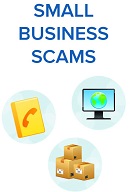Scams Targeting the Business Community
Businesses can also be victims of common scams facing consumers. Here are a few perennials reported by our local business community.

Phony Invoices
The OCP warns area businesses to be wary of phony invoices (PDF). This is where a scammer sends out fake, but real-looking bills in the hopes of getting paid. Or the scammer may send unwanted product and demand a restocking fee if the shipment is challenged.
Phony Charities
Local businesses were also faced with phony charity scams. These businesses were convinced to place charity collection boxes in their shops and restaurants in order to solicit their customers into making payments to fake charities.
Hijacking Wire Transfers
The FBI says that downpayment scams are one of the most common scams that harms businesses and consumers alike. Hackers break into a company's email system and find people with whom the company is about to do a deal. On simulated letterhead of the company or from a lookalike email address , the consumer is directed to wire or electronically send their down payment (but to the crooks). Businesses should let their consumers know when and how payments will be expected and accepted. That way, any surprise requests for wire payment could be met with scepticism.
Business Listing
If you get a call claiming Google is about to remove (audio) your business listing, just hang up. Google is not calling you. According to the Federal Trade Commission (FTC), this is an SEO scam where the company will continue to hit you for more and more fees in order to improve your Google. But a business can manage its listing for free.
Bogus Web Development
Complaint regarding web development scams is on the rise. Before hiring a company to create or update your website or purchase IT equipment, do your research. Is the price or timeline offered well below the cost of competitors? If so, the deal may be too good to be true. Research what other customers are saying about delivery and work product either on the referral platform or on other review sites. Search complaint history with the OCP or Better Business Bureau.
CEO and Manager Imposters
The CEO imposter scam involve crooks who have targeted and researched a specific business, determined the hierarchy, and thus know the managers and their staff. This type of targeted cyberattack is called "whaling" which is a more targeted version of " phishing ." They then direct spoofed emails to those staff members posing as their boss. They ask for wire transfers, gift cards, or prepaid debit cards to help the boss out of a personal or business emergency. This request is always accompanied by a suggestion that the employee fill out a reimbursement request. The convincing nature of these spoofed emails, and employees' hesitance to question orders from their boss, makes this a lucrative scam. Absent access to a corporate account, it is often the employee who bears the brunt of the fraud. If the scam is caught quickly enough, the bank may be able to reverse the transaction and keep the funds from the scammers.
Phishing, Smishing and Vishing
Through employee inattentiveness, businesses are at great risk of phishing (phony + fishing) via email, smishing (phishing via SMS) or vishing (phishing via voice). For more on how you can prevent this form of fraud, see OCP's webpage on Phishing and Pharming and its press release on the same topic.
Resources for More Information
The FTC also provides useful information at its Business Center on how to protect your business from scams and cyber-intrusion. In fact, the FTC reached a settlement agreement with a telemarketing operation for allegedly tricking small businesses, non-profit organizations, and others into paying for overpriced office and cleaning supplies they never ordered. The FTC also reached a settlement with a group of "business coaching" companies and individuals that allegedly used deceptive marketing tactics that robbed aspiring business owners of millions of dollars. Finally, do not be tricked into buying labor posters. The Department of Labor provides these posters for download free.If you think you have been targeted by a scam, please contact the OCP's Business Liaison. Please follow us to stay informed with the latest News and Alerts:


